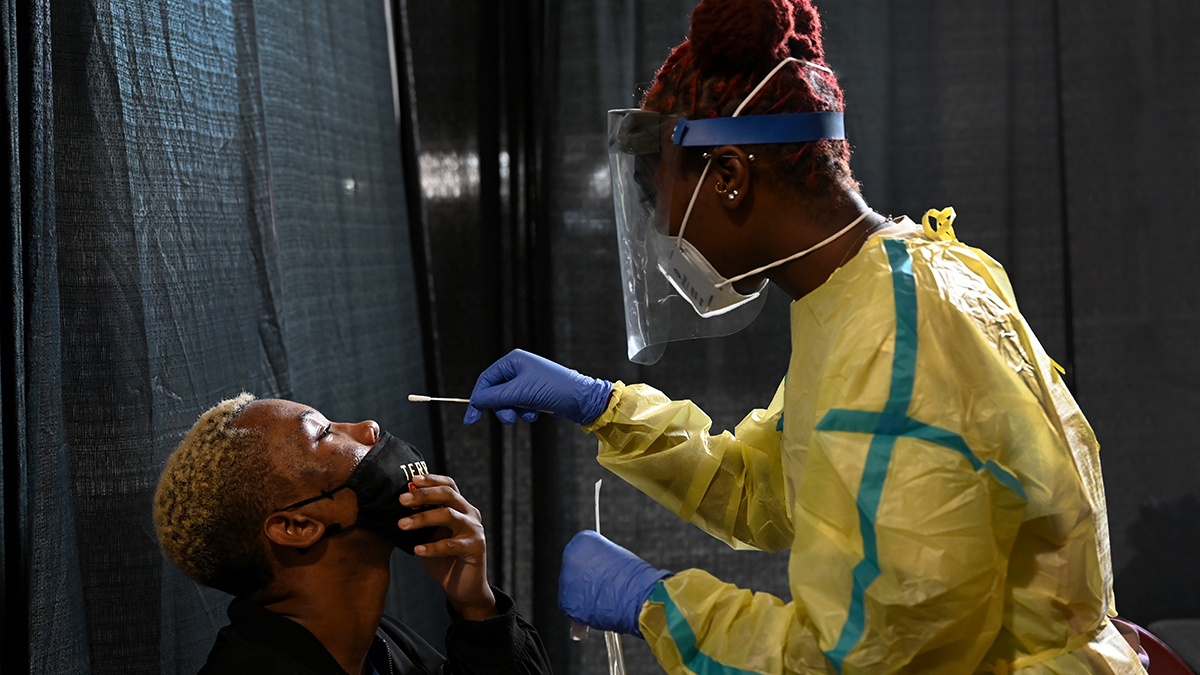The D.C. region surpassed 500,000 confirmed COVID-19 cases Sunday, a troubling landmark that contrasts sharply with the hopeful news of the nation's first coronavirus vaccinations Monday.
In D.C., the first doses of the COVID-19 vaccine are expected to be given at George Washington Hospital.
Health and Human Services Secretary Alex Azar and the Surgeon General will observe COVID-19 vaccinations being administered there Monday.
We're making it easier for you to find stories that matter with our new newsletter — The 4Front. Sign up here and get news that is important for you to your inbox.
As cases rise, local governments are implementing new restrictions.
Beginning Monday, indoor dining capacity in D.C. will drop from 50% to 25%.
The District remains in an adjusted Phase Two of its coronavirus reopening plan, as it has been since Nov. 25.
Prince George’s County is banning all indoor dining and decreasing capacity of casinos and retail stores to 25% starting Wednesday at 5 p.m.
Indoor restaurant dining is put on ice. Outdoor dining will remain at 50% capacity, and restaurants can still offer curbside service and takeout. Capacity at retail stores, currently capped at 50%, will be further reduced to 25% capacity.
The casino at MGM National Harbor will be allowed to stay open but also limited to 25% capacity. Capacity at gyms and fitness studios will be cut back to 25%..
In Montgomery County, indoor dining is expected to stop completely Tuesday at 5 p.m. if new changes are approved by the county council.
The council is also expected to scale back capacity limits in retail stores to one person per 200 ft and 150 total per retail establishment. Capacity limits at sports and religious gatherings are also expected to be tightened.
In Virginia, a curfew is already in effect from midnight to 5 a.m., and will remain in effect through Jan. 31. Gov. Ralph Northam has asked that all Virginians wear a face mask whenever they are in public.
Public gatherings in Virginia are also more limited: The cap is lowered from 25 people to 10 people.
Students at Fairfax County and Fauquier County Public Schools are returning to online learning on Monday.
FCPS said the positivity rate is too high to keep holding classes in-person: It’s been above the 10% threshold for seven days, officials said. The goal is to bring students back after winter break, officials said.
Online learning will continue at Fauquier County Public Schools until winter break.
At this point, hybrid learning may resume in January, when the second term begins.
About 3 million doses of Pfizer's vaccine headed Sunday from Michigan to 145 distribution centers across the U.S.
Critical care nurse Sandra Lindsay was the first person in the U.S. to receive the vaccine on Monday.
“I feel hopeful today. Relieved,” Lindsay said after getting a shot in the arm at Long Island Jewish Medical Center in New York.
The shipments of the Pfizer vaccine represent the biggest vaccination effort in American history as coronavirus infections top 16 million and the death toll runs just shy of 300,000 nationwide.
In D.C., Howard University Hospital and George Washington University Hospital are expected to receive their vaccine allotment Monday, D.C. Mayor Muriel Bowser said at a press conference.
Children's National Hospital, MedStar Georgetown University Hospital and Medstar Washington Hospital Center will receive doses on Tuesday.
Kaiser Permanente will receive vaccine doses on Wednesday.
Virginia Gov. Ralph Northam will share 8,000 COVID-19 vaccine doses with D.C. to vaccinate Virginia residents who work in D.C. health care facilities, D.C.’s Health Director said at a press conference Monday.
Five emergency responders will be the first members of the D.C. Fire and EMS Department to get the COVID-19 vaccine this coming week, a sign that “the light at the end of the tunnel is getting brighter,” Bowser said in a news release.
The group, designated "The First Five," are FEMS Chief John Donnelly, the department’s Medical Director Dr. Robert Holman, Lieutenants Joseph Papariello and Keishea Jackson, and firefighter/EMT Julio Quinteros. All are D.C. residents.
"I’m getting vaccinated for my coworkers, I’m getting vaccinated for my family and I’m getting vaccinated to make a change,” Lieutenant Keishea Jackson said.
Vaccines will be given to 24 Maryland hospitals as early as Monday, including Adventist Healthcare Shady Grove Medical Center, The Johns Hopkins Hospital and University of Maryland Medical Center. Six D.C. hospitals including Howard University and Children’s National are also in line to get boxes containing nearly 1,000 shots.
Hospitals are expecting to continue to receive allocations on a weekly basis, after the initial shipment, a spokesman for the Maryland Department of Health said.
The University of Maryland Medical System recently received the freezers needed to keep the Pfizer vaccine cold. The hospital said it will do a dry run of its vaccine program on Monday.
Local hospitals say some of their vaccine safety measures include staggering vaccines across units to keep all hospital units functioning in case of side effects.
They’ll also have a system for workers to report adverse reactions and keep tabs on how things are going.
Virginia has not released a list of hospitals that will get the first doses. The Inova health system told News4 they expect a shipment next week and will vaccinate eligible employees.
Furthermore, federal veterans’ hospitals in D.C., Baltimore and Richmond will get the first round of vaccines. Just how many doses will be available is unknown, but these are some of the largest Veterans Affairs hospitals in the nation, with dozens of deaths from the virus among patients.
What the Data Shows
The D.C. region now has more than 508,000 confirmed cases of COVID-19, according to data released Monday. Nearly 10,000 lives have been lost to the virus.
D.C. reported an additional 164 cases and one death. Maryland recorded 2,314 new cases and 24 lives lost. Virginia had 2,647 new cases and three additional deaths.
Seven-day rolling averages in the region are leveling off.
D.C.'s average has decreased for five days in a row. D.C.'s case average is currently at 246, Maryland's seven-day average has remained level around the 2,800 mark for three days and Virginia's average has decreased for the second day to 2,877.
Hospitalizations are the highest they've ever been in Virginia and Maryland. A total of 1,845 Virginians are in the hospital with COVID-19 on Monday, following a week-long streak of ever-increasing record highs.
In Maryland, hospitalizations are up to a high of 1,742.
In D.C., 239 people are currently hospitalized with coronavirus – the highest count since June.
Vaccination Plans in DC, Maryland, Virginia
- Virginia: The Virginia Department of Health estimates there are up to 500,000 health care workers and long-term care facility residents in the state who are among top-priority for vaccines. The state announced Friday that 480,000 doses of vaccine from Pfizer and Moderna could arrive by the end of December.
“We will focus initially on the groups that have been most at risk for severe illness from COVID-19 infections and those whose work puts them at greatest risk of contracting COVID-19 infections," Virginia State Health Commissioner Dr. M. Norman Oliver said. - Maryland: Maryland will focus its initial COVID-19 vaccinations on hospital-based health care workers, residents of nursing homes and first responders.
The state is expected to receive 155,000 initial doses of COVID-19 vaccines, and distribution could begin as early as next week for the Pfizer vaccine and later this month for the Moderna vaccine. That initial figure includes 50,700 Pfizer doses and 104,300 Moderna doses. - Washington, D.C.: D.C. expects to receive its first 6,825 doses after Pfizer’s coronavirus vaccine is cleared by the Food and Drug Administration and distributed, D.C. Health Director LaQuandra Nesbitt and Mayor Muriel Bowser said Thursday at a press conference.
It's "impossible to lay out an exact timeline, but the rollout will happen in phases in accordance with Centers for Disease Control and Prevention (CDC) guidance.
The very first vaccines will go to health care workers and first responders who come into contact with COVID-19 patients. The stages of vaccination are Phase 1A for about 85,000 health care workers and first responders, then Phase 1B for more than 310,000 essential workers and at-risk residents. During Phase 2, the vaccine will first become available to the general public.
Local Coronavirus Headlines
- A rapid antigen test might seem like a great idea when you're in a hurry and don't have time to wait a few days for results, but those tests are really designed for people with COVID-19 symptoms and in asymptomatic patients can deliver false positive results.
- News4 has obtained a list of two dozen Maryland hospitals expected to receive the first shipment of Pfizer vaccines once it receives emergency authorization from the Food and Drug Administration.
- Health officials in Virginia say they'll likely have to scale back on contact tracing because coronavirus transmission levels are rising so high.
- Maryland will focus its initial COVID-19 vaccinations on hospital-based health care workers, residents of nursing homes and first responders in the first phase expected to arrive as soon as next week, state officials said Tuesday.
- If federal regulators authorize two COVID-19 vaccine candidates, Virginia expects to receive enough doses by the year's end to begin inoculating nearly all of its health care workers and long-term care facility residents, officials said Friday.
- Help is available for thousands of D.C. residents who have fallen behind on rent payments.
- D.C. Public Schools is preparing for an ambitious pilot program in which it will regularly test some students and staff for the coronavirus.
- Maryland Gov. Larry Hogan announced measures to boost the number of available health care workers and plan for more hospital beds.
- COVID-19 numbers continue to paint a dire picture for Black Americans, and there is an ongoing effort in the Black community to increase testing.
- Maryland released a new contact tracing app, and has reduced indoor operations for bars and restaurants from 75% to 50% in response to rising coronavirus cases and increased hospitalizations.
Reopening Tracker
- Virginia planned to announce new coronavirus restrictions on Thursday.
- Montgomery County's executive has proposed suspending indoor dining, tighter capacity limits at religious institutions and other new restrictions that would take effect 5 p.m. Tuesday, if approved by the county council.
- Maryland tightened restrictions on businesses, bars and restaurants.
- All Smithsonian museums and the National Zoo closed because of rising COVID-19 cases, officials announced.
- Hours before some Fairfax County students were set to return to in-person learning, the school district said that they needed to delay the plan.
- Courts throughout Maryland partially shut down due to the pandemic.
- Virginia announced new measures to fight COVID-19 as cases of the virus have spiked across the country.
- Prince George's County tightened restrictions and required masks to be worn outdoors.
- Montgomery County reduced capacity limits at many businesses, including for indoor dining, to 25%. The county previously stopped giving waivers for alcohol sales after 10 p.m.
- D.C.'s mayor extended the city's coronavirus state of emergency to last through the end of the year.
How to Stay Safe
There are ways to lower your risk of catching coronavirus. Here are guidelines from the CDC:
- Wear a snug-fitting mask that covers your nose and mouth.
- Avoid being indoors with people who are not members of your household. The more people you are in contact with, the more likely you are to be exposed to COVID-19. If you are indoors with people you don’t live with, stay at least six feet apart and keep your mask on.
- Wash your hands often, especially after you have been in a public place.



